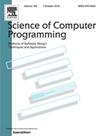为离散事件系统控制器自动生成代码的工具
IF 1.4
4区 计算机科学
Q3 COMPUTER SCIENCE, SOFTWARE ENGINEERING
引用次数: 0
摘要
监督控制理论(SCT)是一种正式的方法,允许计算离散事件系统(DESs)的构造正确控制器,以有限状态机(FSMs)作为其基本构建块。通常,在fsm上实现SCT操作的工具有用于设计、处理、模拟、合成和验证的资源,但没有用于实现的资源,包括代码生成资源。没有它们,设计人员仍然必须手动编写控制解决方案,从而降低了SCT的实际吸引力。本文声称,通过提出的DEScMaker工具,SCT可以更顺利地实现自动化。它接收一个表示SCT合成输出的FSM,并将其转换为C或Python代码,这些代码保留了事件可控性、一组规范中的最大许可性和非阻塞性的思想。该工具可以处理集中式和模块化体系结构,其输出是分层结构的通用实现,具有管理器、事件处理程序以及软件和硬件之间的接口,这需要为每个目标平台定制最少的工作。示例说明了该方法,并允许与经验规划相比量化其收益。本文章由计算机程序翻译,如有差异,请以英文原文为准。
DEScMaker: A tool for automated code generation for discrete event systems controllers
The Supervisory Control Theory (SCT ) is a formal approach that allows computing correct-by-construction controllers for Discrete Event Systems (DESs ), having Finite State Machines (FSMs ) as its basic building block. Usually, tools that implement SCT operations over FSMs have resources for the design, processing, simulation, synthesis, and verification, but not for implementation, including code generation resources. Without them, designers still must manually code the control solution, shedding the practical appeal of SCT. This paper claims that SCT can more smoothly meet automated implementation via the proposed DEScMaker tool. It receives an FSM representing the output of the SCT synthesis and converts it into C or code that preserves the idea of event controllability, maximum permissiveness within a set of specifications, and non-blockingness. The tool handles both centralized and modular architectures, and its output is a generic implementation structured in layers, with supervisors, an event handler, and the interface between software and hardware, which requires minimal effort to be customized for each target platform. Examples illustrate the approach and allow for quantifying its gains compared with empirical programming.
求助全文
通过发布文献求助,成功后即可免费获取论文全文。
去求助
来源期刊

Science of Computer Programming
工程技术-计算机:软件工程
CiteScore
3.80
自引率
0.00%
发文量
76
审稿时长
67 days
期刊介绍:
Science of Computer Programming is dedicated to the distribution of research results in the areas of software systems development, use and maintenance, including the software aspects of hardware design.
The journal has a wide scope ranging from the many facets of methodological foundations to the details of technical issues andthe aspects of industrial practice.
The subjects of interest to SCP cover the entire spectrum of methods for the entire life cycle of software systems, including
• Requirements, specification, design, validation, verification, coding, testing, maintenance, metrics and renovation of software;
• Design, implementation and evaluation of programming languages;
• Programming environments, development tools, visualisation and animation;
• Management of the development process;
• Human factors in software, software for social interaction, software for social computing;
• Cyber physical systems, and software for the interaction between the physical and the machine;
• Software aspects of infrastructure services, system administration, and network management.
 求助内容:
求助内容: 应助结果提醒方式:
应助结果提醒方式:


